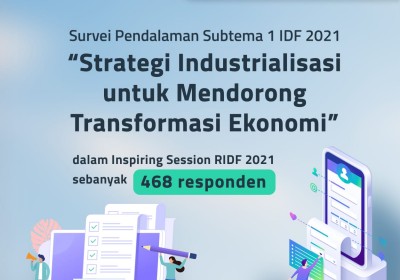Innovation, Technology, Productivity and Competitiveness Crucial Factors of Industrialization
August 19, 2021
JAKARTA – Indonesia's industrial sector is currently experiencing a slowdown of growth, which is shown also by the fact that the country's industries are growing at a slower pace than the national economic growth rate.
At the same time, the Covid-19 pandemic has altered Indonesia's economic transformation efforts to the point that it now needs to resort to different strategies to respond to the various challenges which are inhibiting efforts to recover the economy to pre-Covid-19 levels.
The industrial sector must remain Indonesia's main driver of economic growth due to the greater opportunities to foster a more productive workforce and to facilitate the accumulation of both public and worker knowledge and knowhow.
This fact is what is driving the Ministry of National Development Planning/Bappenas, through its Indonesia Development Forum (IDF) event, to hold several online surveys during its Inspiring Session Road to IDF webinars which took place on Tuesday (29/6). Up to 458 subjects across Indonesia participated in this survey, which consisted of people of various occupational backgrounds from government workers, academics and private sector workers to university students, entrepreneurs and housewives.
The purpose of the survey was to capture the aspirations of the webinars' participants, the results of which will be used as input for the IDF's next series of webinars, namely the Idea Series. One of the survey topics revolved around one of the IDF's 5 subthemes, namely on Industrialization Strategies to Promote Economic Transformation, and it found that public aspirations for Indonesia's industrialization efforts relate mainly to innovation, technological development, productivity increases and export-oriented competitiveness.
In the context of industrial development as Indonesia's main economic transformation driver, 43% respondents said that improving the country's technological capabilities and further innovation in this field are the most urgent issues that need to be addressed first. Furthermore, 16.8% of respondents chose addressing global competitiveness as the most pressing issue, while 14.4% chose the improvement of Indonesia's business and investment climate as the main priority.
Up to 13.5% of respondents chose productivity and production capacity development as priority while only 12% put eco-friendly industrial growth as the main issue.
A majority of respondents also voiced that technological utilization and innovation development was an important step to consider in the current climate, due to the increasing digitalization and green policy efforts happening in Indonesia.
These findings are in line with the post-pandemic conditions that have resulted in increasing automation trends in the country, reflected in the increasing usage of online work and telemedicine services as well as the increasing global commitment by many countries in the world to implement greener recovery strategies.
Also, strategies to improve technology, innovation and diversification of the economy were also considered very crucial by 40.4% of respondents, who added that these factors are very important to increase Indonesia's industrial resilience and encourage economic recovery. These concerns are in line with the fact that growth rates contracted further in areas that have low economic diversification levels such as Bali, who experienced a 9.3% growth contraction in 2020 due to its dependence on the tourism sector.
In order for industries that have grown during the pandemic period to develop further, they must possess high competitiveness levels so that they are able to help lift the economic trajectory higher than the pre-Covid-19 levels. Within this context, up to 27.9% of respondents consider company strategies that focus on innovation and exports as crucial in growing Indonesia's global competitiveness rate.
Notably, up to 42.8% voiced that any successes in improving competitiveness levels must be supported by industrial policies that focus on developing labor productivity levels and technological adaptation. Doing so will help increase worker productivity and the technological content of products produced by national industries, including those geared for export.
The Covid-19 pandemic has negatively affected the public's livelihoods and income streams, the performance of sectors that drive the economy and efforts to maintain environmental sustainability. The pandemic has also shifted the trajectory of economic transformation to the point that the government must adopt alternative strategies to help restore and raise the prospect of higher economic growth.
Indonesia’s Research Institutions Supporting the Development of the Electric Vehicle Industry
Indonesian Muslim Fashion and Cosmetics IKMs Shine at Dubai World Expo 2020
Govt Steps Up UMKM Transformation Efforts in the Midst of Pandemic Slowdown
Govt Encourages Promotion of IKM Products in Digital Era
Government Begins Developing Maritime Training Center in Makassar
Tweets by IDDevForum
